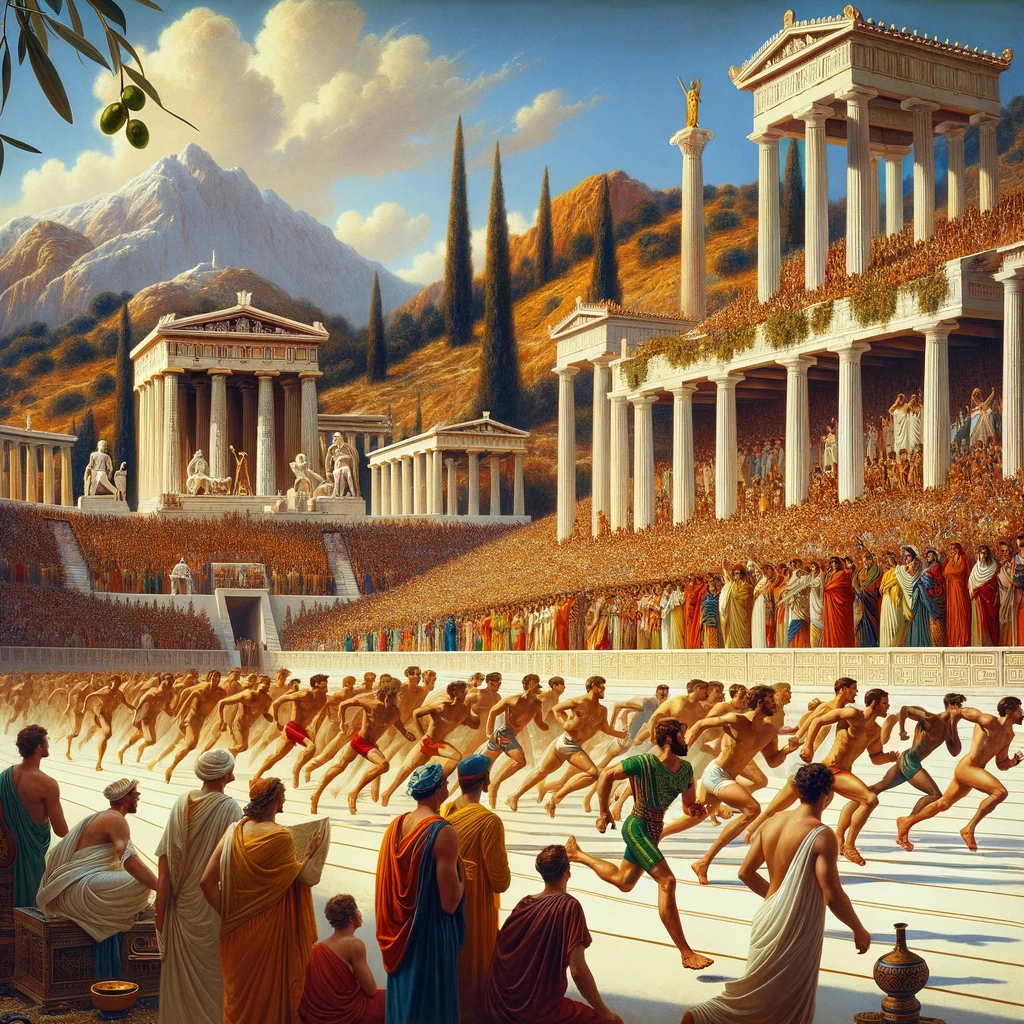The Olympic Games stand as a testament to human athleticism, competitive spirit, and the desire for international camaraderie. But to truly appreciate the magnitude of this global event, we must journey back to its roots, to the very first Olympic Games held in ancient Greece. This historical exploration offers not just a glimpse into the athletic competitions of yore but also reveals the profound cultural and religious significance these games held in the ancient world.
The key takeaway
- The 1st Olympic Games in ancient Greece, originating in 776 BC, were foundational in blending athletic competition with religious and cultural significance, dedicated to the god Zeus.
- These Games underscored virtues such as honor, excellence, and unity, setting a precedent for the importance of physical prowess and spiritual devotion in Greek society.
- Despite evolving significantly over the centuries, the core ideals of the Olympic Games have remained constant, fostering a spirit of competition and the pursuit of excellence across generations.
- The ancient Olympics’ legacy profoundly influences the modern Olympic movement, promoting peace, understanding, and the celebration of human potential and achievements among diverse global communities.
- The enduring values from the ancient Olympic Games—excellence, friendship, and respect—continue to inspire and shape the ethos of the modern Olympics, bridging past and present in the realm of competitive sports and beyond.
The Origins of the Olympic Games
The inception of the Olympic Games is shrouded in mythology and history, with tales of gods and heroes that highlight the deep connection the ancient Greeks had with their deities and the natural world around them. According to legend, the Games were founded by Heracles (the Roman Hercules), who after completing his twelve labors, decided to celebrate by organizing a sporting event in Olympia. This mythological origin story underscores the divine approval and religious fervor that the Games were meant to embody.
Historically, the site of Olympia was chosen for its beauty and its significance to Greek religion. Olympia was dedicated to Zeus, the king of the Greek gods, and the Games were held in his honor. The event was as much a religious festival as it was an athletic competition, with sacrifices and offerings made to Zeus and other gods. The choice of Olympia as the site for the Games was no accident; it was a neutral ground that belonged to no specific city-state (polis), which allowed for the peaceful gathering of competitors from across the Greek world.
The Inception of the 1st Olympic Games
The traditional date for the first Olympic Games is 776 BC, a time when Greece was emerging from its dark ages and city-states were beginning to flourish. These early Games were part of a broader cultural renaissance and were closely tied to the social and political landscapes of the era. They served as a unifying force among the Greek city-states, offering a peaceful competition venue amidst the frequent conflicts that characterized the Greek world.
The establishment of the Olympic Games in 776 BC was a landmark event that was recorded by Hippias, a Sophist, and later by other historians, signifying the importance of the Games as a historical event. The Games were held every four years, a period known as an Olympiad, which became a unit of time measurement in ancient Greece.
Events and Competitions of the 1st Olympic Games
The athletic events of the first Olympic Games were limited compared to later editions but were no less challenging. The only event recorded at the first Games was the stadion, a sprint of roughly 192 meters. This race was run in the stadium of Olympia, a word that has since become synonymous with sporting arenas worldwide. The stadion race was a test of speed and endurance, showcasing the physical prowess of the competitors.
As the Games evolved, more events were added, including longer foot races, wrestling, boxing, pentathlon (comprising running, jumping, discus throw, spear throw, and wrestling), and chariot racing. These additions reflected the Greeks’ appreciation for a variety of physical skills and their understanding of the body’s capabilities.
The Athletes of the Ancient Olympics
The competitors in the 1st Olympic Games were Greek men from various city-states, showcasing the pan-Hellenic nature of the event. These athletes were free citizens and had to undergo rigorous training to qualify for the Games. The ancient Greeks held amateur athletes in high esteem, believing that sports were a way to achieve personal honor and glory, as well as to pay homage to the gods.
Training for the Games was a serious affair, with athletes dedicating themselves to physical conditioning and adhering to strict diets. The gymnasium was the center of athletic training, where athletes would prepare for the Games under the guidance of experienced trainers. Participation in the Olympics was a matter of great pride, and victors were celebrated as heroes in their home city-states.
The Prize for Olympic Victors
The rewards for victors in the 1st Olympic Games were symbolic, reflecting the Games’ emphasis on honor and glory over material gain. Winners were awarded an olive wreath, cut from the sacred tree near the temple of Zeus at Olympia. This simple prize, known as the kotinos, was a symbol of peace, virtue, and achievement. Beyond the wreath, victors received no other material rewards from the Games themselves, but the honor of winning brought significant prestige.
The victors’ home city-states often rewarded them with substantial prizes, including money, free meals for life, front-row seats at public events, and statues erected in their honor. This recognition underscores the importance of athletic success in ancient Greek society, where physical prowess was intertwined with civic pride and personal honor.
The Legacy of the 1st Olympic Games
The 1st Olympic Games laid the foundation for what would become one of the most enduring traditions of the ancient world, continuing uninterrupted for nearly 12 centuries until AD 393 when they were abolished by the Roman emperor Theodosius I. The legacy of these ancient Games is profound, influencing not only subsequent iterations of the Olympics but also the modern revival of the Games in 1896.
The ancient Olympics played a crucial role in shaping Greek culture and identity, promoting values such as fair play, honor, and the pursuit of excellence. These values have transcended time, influencing modern sports and the Olympic movement. The Olympic Games, both ancient and modern, stand as a symbol of unity and peace, bringing together people from diverse backgrounds in celebration of human achievement and potential.
Comparing Ancient and Modern Olympic Games
Evolution of Olympic Events
| Event | Description in Ancient Olympics | Description in Modern Olympics |
|---|---|---|
| Stadion Race | A sprint of about 192 meters, the only event at the first Olympics | 100m, 200m, and 400m races, among others |
| Pentathlon | Comprised running, long jump, discus throw, javelin throw, and wrestling | Modern pentathlon includes fencing, swimming, equestrian show jumping, and a combined event of pistol shooting and running |
| Wrestling | A significant event, showcasing physical strength without time limits | Wrestling remains a key event, with Greco-Roman and freestyle categories |
| Boxing | Very rough, with fewer rules and no rounds or weight classes | Organized into rounds with specific weight classes and strict rules |
| Chariot Racing | Dangerous and prestigious event held in the hippodrome | Not included in the modern Olympic Games |
| Marathon | Not part of the ancient Games but inspired by the legend of Pheidippides | A standard Olympic event, covering a distance of 42.195 kilometers |
While the spirit of competition and celebration of human achievement remain constant, the Olympic Games have undergone significant changes since their inception in ancient Greece. The modern Olympics feature a wide array of sports, including those not present in the ancient Games, and welcome athletes from every corner of the globe, regardless of gender, race, or nationality.
One of the most significant differences is the inclusion of women in the modern Olympics, a stark contrast to the ancient Games where women were not allowed to compete or even attend. Today, the Olympics strive for gender equality, with efforts to include a balanced number of events for men and women.
The scale and spectacle of the modern Games also contrast with the more modest ancient Olympics. Modern Olympics are global events featuring elaborate opening and closing ceremonies, with thousands of athletes participating. Despite these differences, the core ideals of the Olympic Games—excellence, friendship, and respect—echo the values that were celebrated in ancient Olympia.
Frequently Asked Questions (FAQs) about the 1st Olympic Games
- What led to the establishment of the Olympic Games? The Olympic Games were established as part of a religious festival honoring Zeus, reflecting the ancient Greeks’ desire to combine physical prowess with spiritual devotion.
- How were the ancient Olympic Games organized? The ancient Games were organized by the Hellanodikai, judges who oversaw the events, ensured fair play, and maintained the sacred truce during the Games.
- Who could participate in the ancient Olympic Games? Participation was limited to free male citizens of Greek city-states who could speak Greek. Athletes underwent rigorous training and had to prove their Greek heritage.
- What was the role of women in the ancient Olympic Games? Women were not allowed to compete in or attend the ancient Games, though they could own chariots in the races and were honored if their chariots won. Separate games, the Heraea, were held for women in honor of Hera.
Conclusion
The 1st Olympic Games in ancient Greece were more than just an athletic competition; they were a celebration of human potential, a dedication to the gods, and a crucial element of Greek culture and identity. The legacy of these ancient Games continues to inspire and shape the modern Olympic movement, reminding us of the timeless values of excellence, respect, and unity. As we celebrate the achievements of modern athletes, we also pay homage to the ancient competitors whose dedication and spirit ignited the Olympic flame that burns brightly to this day.
Call to Action
For those inspired by the enduring legacy of the Olympic Games, exploring more about ancient Greek culture and its contributions to modern society can offer rich insights into the values and traditions that have shaped our world. Visiting historical sites related to the ancient Olympics, such as Olympia in Greece, can provide a tangible connection to the past, allowing us to walk in the footsteps of the athletes who competed for glory and honor under the watchful eyes of the gods.

